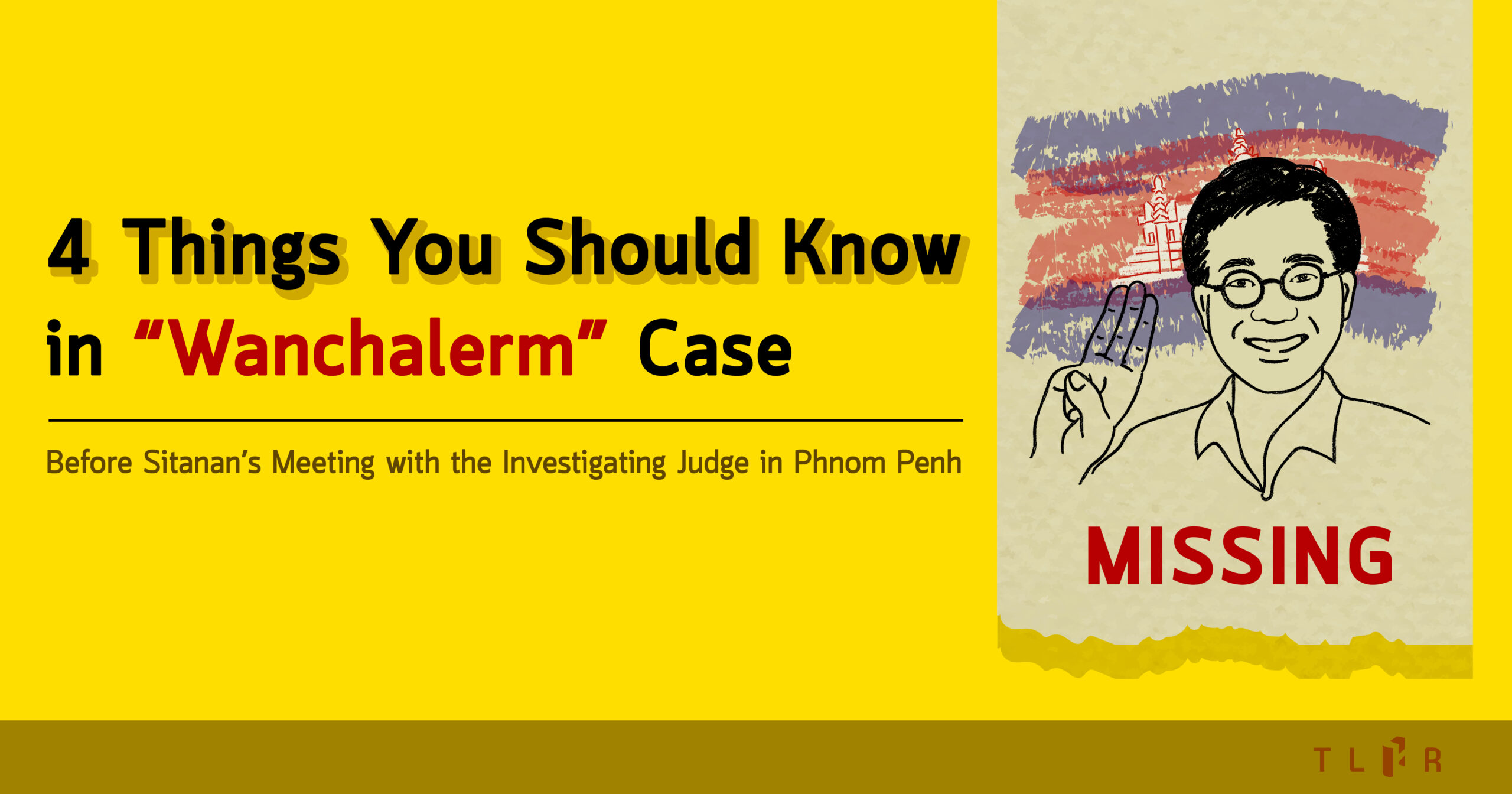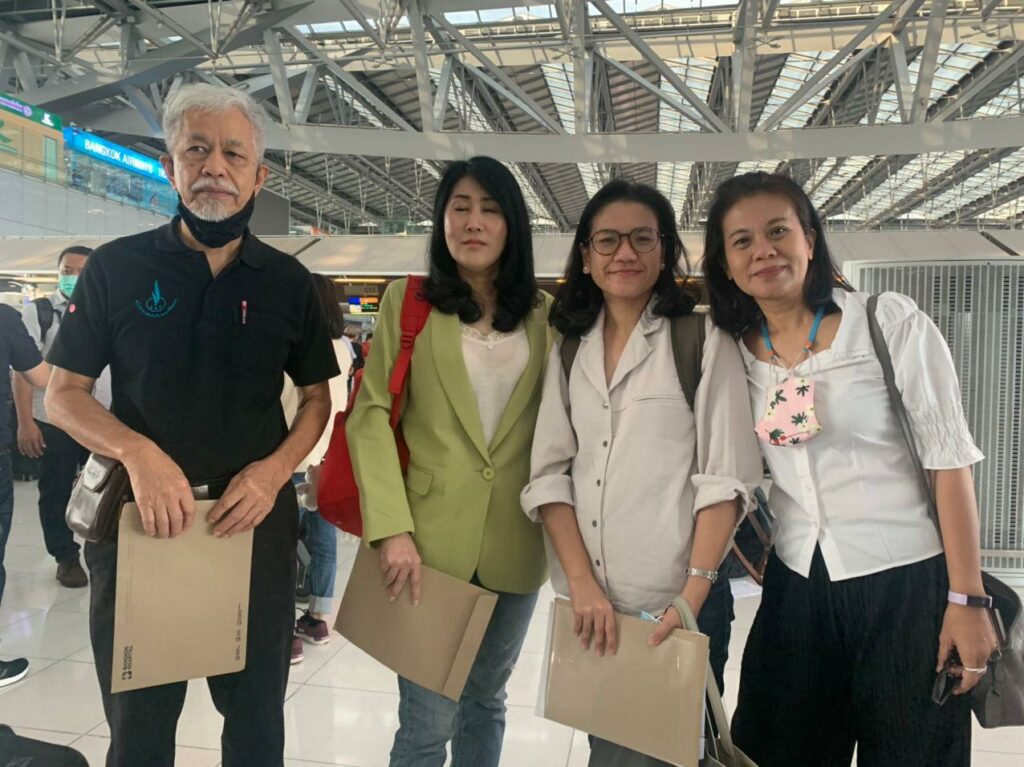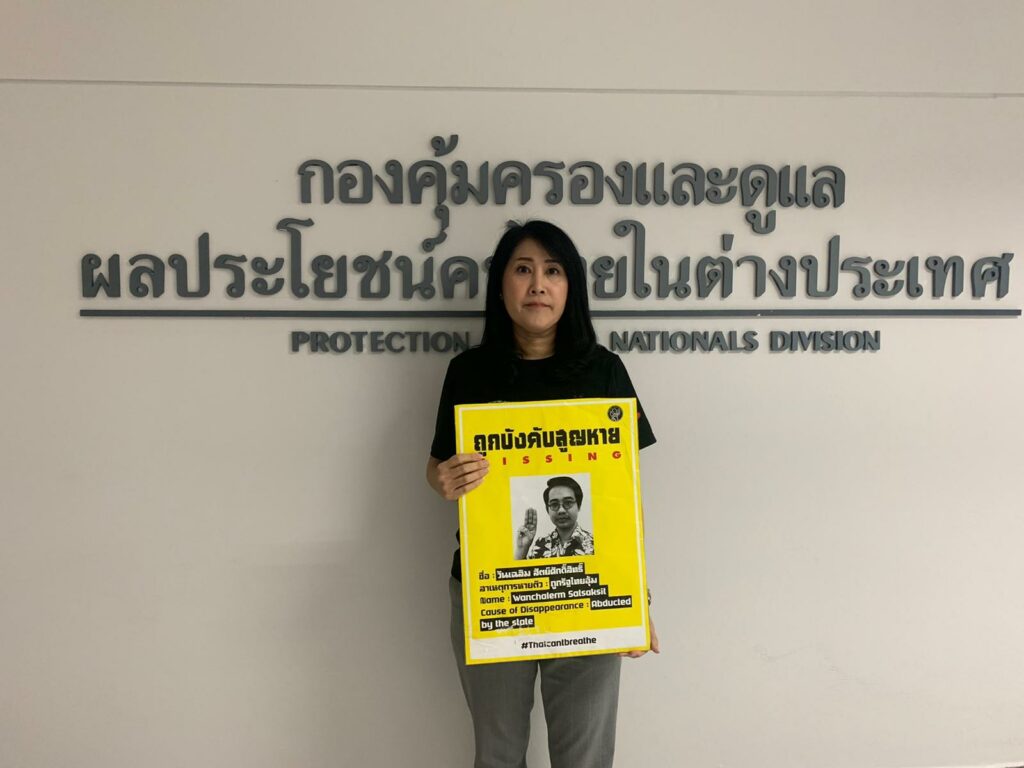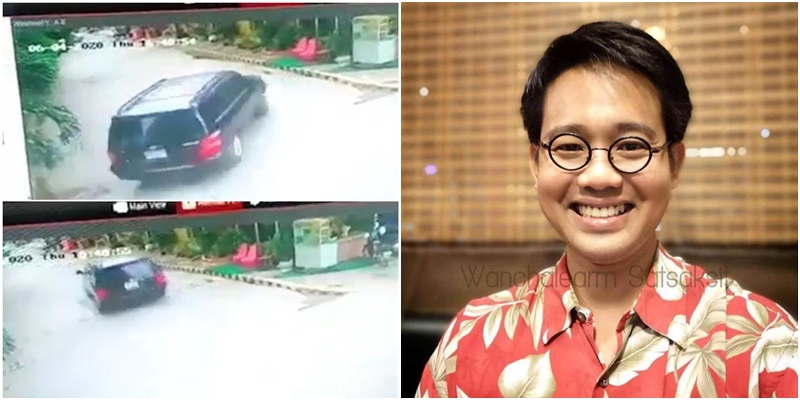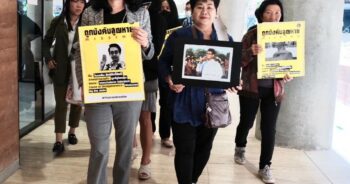It has been almost six months since Wanchalearm ‘Tar’ Satsaksit, a pro-democracy and LGBT rights activist and political exile in Cambodia, disappeared near Mekong Garden Apartment, his residence on the Mekong riverbank in Chroy Changva District, Phnom Penh, on 4 July 2020.
Sitanan Satsaksit, Tar’s elder sister, has finally arrived in Cambodia after almost half-a-year wait thanks to the new wave of Covid-19 pandemic in Cambodia. She was preparing to provide information to the investigating judge to verify the fact that the kidnap really took place in Cambodia, the perpetrators were carrying arms, and the family had made an absolute effort to trace Wanchalerm through domestic and international mechanisms.
Thai Lawyers for Human Rights would like to show 4 things you should know before Sitanan began her justice-seeking journey to Cambodia.
- The judge issued a second warrant to summon Sitanan to give statement for the case on 8 December 2020.
Sitanan received the second warrant issued by the investigating judge at the Phnom Penh Municipal Court dated 27 October 2020 to meet on 8 December 2020 at 9.00 a.m. on the 3rd floor of the Phnom Penh Municipal Court as part of a criminal investigation.
The warrant written in Khmer reads “… are asked to travel to provide information regarding the unlawful arrest or detention and possession of arms, which took place close to Mekong Garden Apartment located near the Mekong River, Chroy Changva District, Phnom Penh, Cambodia.”
This summon warrant is the second official document addressing Sitanan, after the investigating judge had issued a warrant on 6 October 2020 summoning her to the Court on 19 October 2020. However, the appointment with the judge at that time came at a short notice, making it impossible when taking into account the mandatory Covid-19 self-quarantine period.
Moreover, the logistic arrangement could not be realized within such a limited time. Thus, Sitanan was not able to travel to Phnom Penh according to the timeframe stated in the first warrant.
Towards the end of July 2020, Sitanan was contacted by the lawyer in Cambodia that the royal prosecutor at the Phnom Penh Municipal Court would like to involve Sitanan in the investigation as well, as Sitanan had previously submitted a complaint on 8 July 2020 requesting an investigation and prosecution of the group of armed people who abducted her brother. Nevertheless, given the serious pandemic situation in July, international traveling then was extremely difficult.
Meanwhile, the proposal that the prosecutors of the two countries jointly organize a video conference to allow Sitanan to give testimony according to the Mutual Legal Assistance in Criminal Matters Treaty (MLAT) received no response from the Cambodian prosecutors.
- Cambodia uses an inquisitorial system for criminal cases. Providing statements to the investigating judge is still not considered a part of the prosecution process.
Cambodia’s criminal procedure relies on an “inquisitorial system”, which differs from that in the country with an “adversarial system” like Thailand. The criminal procedure in Cambodia is divided into 3 stages before the court trial, which are:
- When a criminal offence takes place and a complaint is received from the victim, the respective police officers conduct an investigation under the prosecutor’s guidance. Once finished, the police officers forward the case to the royal prosecutor of the respective court of jurisdiction.
- The royal prosecutor conducts an investigation in order to obtain adequate primary facts and produces a case summary. Then, the royal prosecutor forwards the case file to the investigating judge. Once received, the judge investigates and compiles evidences once more, as well as looks into the potential perpetrator(s).
- Once the investigation is completed, the investigating judge sends his/her/their case file back to the responsible royal prosecutor. If the royal prosecutor finds the investigation inadequate, he/she/they may return the case file to the investigating judge for additional investigation. On the other hand, if the royal prosecutor finds the investigation adequate, he/she/they sends the final case file attaching his/her/their opinions about the perpetrator to the trial judge. Only this stage constitutes a part of prosecution.
Thus, Sitanan’s trip to Phnom Penh in November is a part of a pre-trial investigation carried out by the investigating judge of the Phnom Penh Municipal Court. Nevertheless, this is still regarded as a progress of the judicial procedure in Cambodia, since Sitanan, entrusted by Wanchalerm’s mother, submitted a complaint to the royal prosecutor at the Phnom Penh Municipal Court in July.
- The UN human rights mechanisms had been closely following Wanchalerm’s case before the government’s assistance arrived.
The Cambodian government’s reply to the United Nations’ Committee on Enforced Disappearances (CED) dated 12 August 2020 recommends that the Ministry of Interior of Cambodia asks government officers in the country and outside of the country as well as relevant witnesses to cooperate and give information for the benefits of the investigation. Moreover, all parties must not do anything that would jeopardize the official investigation undertaken by Cambodia. Finally, at the end of October, Sitanan was invited to give testimony to the investigating judge at the Phnom Penh Municipal Court.
>> Open Thailand and Cambodia’s Responses to the UN Mechanisms. Still No Trace of Wanchalerm’s Fate
The Thai government has also issued a letter in response to the expert working group consisting of four UN agencies dated 10 August 2020, stating that it was in close contact with Wanchalerm’s family to report on the progress of the investigation of the Cambodian government. Recently, between the end of October and the beginning of November, the Division of Protection of Thai Nationals Abroad, Department of Consular Affairs, has coordinated with the Ministry of Foreign Affairs in Cambodia and the Embassy of Cambodia in Thailand to issue a “friendship visa” (Type C Visa) to allow Sitanan and lawyers to travel to Cambodia, despite a tight timeframe with regards to the special monthly Covid-19 chartered flight from Thailand to Phnom Penh.
The operations in terms of criminal investigation and the coordination between the two governments to facilitate the trip to the court have enabled Wanchalerm’s enforced disappearance case to move one step forward.
At the same time, Wanchalerm’s family has been trying to find the disappearance victim themselves since June. Sitanan and family have lodged complaints through the parliamentary mechanism, the judicial process, as well as domestic and international human rights mechanisms. Their efforts eventually managed to initiate the criminal proceeding in Cambodia.
Being the last person Wanchalerm talked to before he disappeared has served as a push for Sitanan to seek and uncover the truth about her brother.
>> Wanchalerm’s Family Successfully Submitted the Complaint to the Cambodian Government
>> Another Step Towards Justice: Wanchalerm’s Sister Submits a Complaint to DSI
- The Thai government conducted a covert investigation in Cambodia, reported no useful information.
On 5 November 2020, at the press conference on the recent protests and prosecution of protestors at the Metropolitan Police Bureau, a news reporter inquired about the progress on Wanchalerm’s disappearance. Pol. Col. Kritsana Pattanacharoen, vice spokesperson of the Royal Thai Police Headquarters, replied that he was informed that the Thai government had assistant diplomatic police stationed in Cambodia who coordinated closely with the police in Thailand to report on any updates that were necessary for the Thai government and useful for the victim. Within the country, the investigation and attempt to collect more information were ongoing, and he was ready to cooperate with the relevant organizations on this.
Pol. Col. Kritsana also answered the reporter’s question about the details of the received information that it was mostly related to cooperation possibilities and nothing very useful. He stressed that the police had already undertaken steps needed. He went on to say that he had also heard the report that the family would submit a request asking the Cambodian court to do something. Lastly, he wrapped up Wanchalerm questions that news was being exchanged between the two sides.
>> Review the “Crime” for Not Reporting to the NCPO: Motive for Wanchalerm’s 6-year Exile
Wanchalerm Satsaksit is 38 years old and from Ubon Ratchathani. He used to work for an NGO on HIV and LGBTIQ+ issues. After the 2014 coup, he fled the country because he refused to report himself to the NCPO according to the NCPO Order no. 44/2557. Later, he was also accused of being the admin of the Facebook page “I must have got 100 million from Thaksin” containing political satires and criticisms of NCPO when it was still in power. Moreover, there was also news that Wanchalerm was charged with section 112 of the Penal Code and had an arrest warrant under his name. However, Maj. Gen. Burin Tongprapai, director of the Office of Judge Advocate and former legal expert of the NCPO, confirmed to the press members on 8 June 2020 that the NCPO did not press charges against Wanchalerm on this offence, as the news had suggested.
